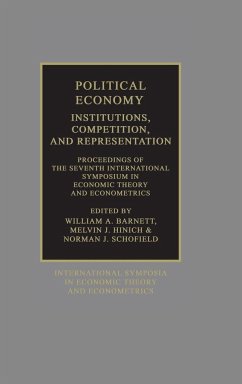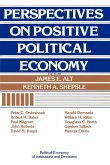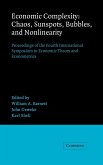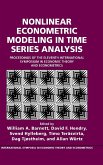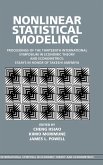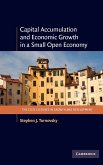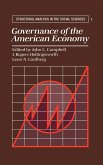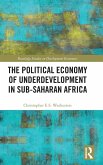A. Barnett / Norman Schofield / Melvin Hinich (eds.)Institutions, Competition and Representation
Political Economy
Institutions, Competition and Representation
Herausgeber: Barnett, William A.; Hinich, Melvin; Schofield, Norman
A. Barnett / Norman Schofield / Melvin Hinich (eds.)Institutions, Competition and Representation
Political Economy
Institutions, Competition and Representation
Herausgeber: Barnett, William A.; Hinich, Melvin; Schofield, Norman
- Gebundenes Buch
- Merkliste
- Auf die Merkliste
- Bewerten Bewerten
- Teilen
- Produkt teilen
- Produkterinnerung
- Produkterinnerung
This volume documents recent advances in the development of concepts and methods in political economy.
Andere Kunden interessierten sich auch für
![Perspectives on Positive Political Economy Perspectives on Positive Political Economy]() E. Alt / A. Shepsle (eds.)Perspectives on Positive Political Economy41,99 €
E. Alt / A. Shepsle (eds.)Perspectives on Positive Political Economy41,99 €![Economic Complexity Economic Complexity]() A. Barnett / John Geweke / Karl Shell (eds.)Economic Complexity119,99 €
A. Barnett / John Geweke / Karl Shell (eds.)Economic Complexity119,99 €![Nonlinear Econometric Modeling in Time Series Nonlinear Econometric Modeling in Time Series]() A. Barnett / F. Hendry / Svend Hylleberg / Timo Teräsvirta / Dag Tjøstheim / Allan Würtz (eds.)Nonlinear Econometric Modeling in Time Series94,99 €
A. Barnett / F. Hendry / Svend Hylleberg / Timo Teräsvirta / Dag Tjøstheim / Allan Würtz (eds.)Nonlinear Econometric Modeling in Time Series94,99 €![Nonlinear Statistical Modeling Nonlinear Statistical Modeling]() Cheng Hsiao / Kimio Morimune / L. Powell (eds.)Nonlinear Statistical Modeling185,99 €
Cheng Hsiao / Kimio Morimune / L. Powell (eds.)Nonlinear Statistical Modeling185,99 €![Capital Accumulation and Economic Growth in a Small Open Economy Capital Accumulation and Economic Growth in a Small Open Economy]() Stephen J. TurnovskyCapital Accumulation and Economic Growth in a Small Open Economy78,99 €
Stephen J. TurnovskyCapital Accumulation and Economic Growth in a Small Open Economy78,99 €![Governance of the American Economy Governance of the American Economy]() L. Campbell / J. Hollingsworth / N. Lindberg (eds.)Governance of the American Economy160,99 €
L. Campbell / J. Hollingsworth / N. Lindberg (eds.)Governance of the American Economy160,99 €![The Political Economy of Underdevelopment in Sub-Saharan Africa The Political Economy of Underdevelopment in Sub-Saharan Africa]() Christopher E S WarburtonThe Political Economy of Underdevelopment in Sub-Saharan Africa197,99 €
Christopher E S WarburtonThe Political Economy of Underdevelopment in Sub-Saharan Africa197,99 €-
-
-
This volume documents recent advances in the development of concepts and methods in political economy.
Hinweis: Dieser Artikel kann nur an eine deutsche Lieferadresse ausgeliefert werden.
Hinweis: Dieser Artikel kann nur an eine deutsche Lieferadresse ausgeliefert werden.
Produktdetails
- Produktdetails
- Verlag: Cambridge University Press
- Seitenzahl: 538
- Erscheinungstermin: 11. März 2016
- Englisch
- Abmessung: 235mm x 157mm x 36mm
- Gewicht: 1015g
- ISBN-13: 9780521417815
- ISBN-10: 0521417813
- Artikelnr.: 35450871
- Herstellerkennzeichnung
- Libri GmbH
- Europaallee 1
- 36244 Bad Hersfeld
- gpsr@libri.de
- Verlag: Cambridge University Press
- Seitenzahl: 538
- Erscheinungstermin: 11. März 2016
- Englisch
- Abmessung: 235mm x 157mm x 36mm
- Gewicht: 1015g
- ISBN-13: 9780521417815
- ISBN-10: 0521417813
- Artikelnr.: 35450871
- Herstellerkennzeichnung
- Libri GmbH
- Europaallee 1
- 36244 Bad Hersfeld
- gpsr@libri.de
Political economy: a personal interpretation and an overview Norman J.
Schofield; Part I. Perspectives on Political Economy: 1. Political
ideology, communication, and community Melvin J. Hinich and Michael C.
Munger; 2. Implementation and enforcement in institutional modeling Leonid
Hurwicz; 3. Toward a theory of institutional change Douglas C. North; 4.
The development of contemporary political theory Peter C. Ordeshook; Part
II. Representation and Voting: 5. Proportional representation, approval
voting, and coalitionally straightforward elections Roger B. Myerson; 6.
Party competition in a spatial model of coalition Norman J. Schofield; 7.
Some foundations for empirical study in the Euclidean spatial model of
social choice Craig A. Tovey; Part III. Political Institutions: 8.
Communications in institutions: efficiency in a repeated Prisoner's Dilemma
with hidden information Randall L. Calvert; 9. The courts and slavery in
the United States: property rights and credible commitment John N. Drobak;
10. On the pervasiveness of sophisticated sincerity Tim Groseclose and
Keith Krehbiel; 11. Initial versus continuing proposal power in legislative
seniority systems Richard D. McKelvey and Raymond Riezman; Part IV.
Political Competition: 12. Adverse selection and moral hazard in a repeated
elections model Jeffrey S. Banks and Rangarajan K. Sundaram; 13. Campaign
contributions and party-candidate competition in services and policies
David P. Baron and Jongryn Mo; 14. Polarization, incumbency, and the
personal vote John Londregan and Thomas Romer; 15. Credibility and the
responsiveness of direct legislation; Part V. Information Acquisition by
Government: 16. Information acquisition and orthogonal argument David
Austen-Smith; 17. A welfare analysis of political action Susanne Lohmann;
Part VI. Government Behaviouor; 18. Monetary policy and credibility under
exact monetary aggregation William A. Barnett; 19. A general equilibrium
model with endogenous government behaviour Eric Drissen and Frans Van
Winden.
Schofield; Part I. Perspectives on Political Economy: 1. Political
ideology, communication, and community Melvin J. Hinich and Michael C.
Munger; 2. Implementation and enforcement in institutional modeling Leonid
Hurwicz; 3. Toward a theory of institutional change Douglas C. North; 4.
The development of contemporary political theory Peter C. Ordeshook; Part
II. Representation and Voting: 5. Proportional representation, approval
voting, and coalitionally straightforward elections Roger B. Myerson; 6.
Party competition in a spatial model of coalition Norman J. Schofield; 7.
Some foundations for empirical study in the Euclidean spatial model of
social choice Craig A. Tovey; Part III. Political Institutions: 8.
Communications in institutions: efficiency in a repeated Prisoner's Dilemma
with hidden information Randall L. Calvert; 9. The courts and slavery in
the United States: property rights and credible commitment John N. Drobak;
10. On the pervasiveness of sophisticated sincerity Tim Groseclose and
Keith Krehbiel; 11. Initial versus continuing proposal power in legislative
seniority systems Richard D. McKelvey and Raymond Riezman; Part IV.
Political Competition: 12. Adverse selection and moral hazard in a repeated
elections model Jeffrey S. Banks and Rangarajan K. Sundaram; 13. Campaign
contributions and party-candidate competition in services and policies
David P. Baron and Jongryn Mo; 14. Polarization, incumbency, and the
personal vote John Londregan and Thomas Romer; 15. Credibility and the
responsiveness of direct legislation; Part V. Information Acquisition by
Government: 16. Information acquisition and orthogonal argument David
Austen-Smith; 17. A welfare analysis of political action Susanne Lohmann;
Part VI. Government Behaviouor; 18. Monetary policy and credibility under
exact monetary aggregation William A. Barnett; 19. A general equilibrium
model with endogenous government behaviour Eric Drissen and Frans Van
Winden.
Political economy: a personal interpretation and an overview Norman J.
Schofield; Part I. Perspectives on Political Economy: 1. Political
ideology, communication, and community Melvin J. Hinich and Michael C.
Munger; 2. Implementation and enforcement in institutional modeling Leonid
Hurwicz; 3. Toward a theory of institutional change Douglas C. North; 4.
The development of contemporary political theory Peter C. Ordeshook; Part
II. Representation and Voting: 5. Proportional representation, approval
voting, and coalitionally straightforward elections Roger B. Myerson; 6.
Party competition in a spatial model of coalition Norman J. Schofield; 7.
Some foundations for empirical study in the Euclidean spatial model of
social choice Craig A. Tovey; Part III. Political Institutions: 8.
Communications in institutions: efficiency in a repeated Prisoner's Dilemma
with hidden information Randall L. Calvert; 9. The courts and slavery in
the United States: property rights and credible commitment John N. Drobak;
10. On the pervasiveness of sophisticated sincerity Tim Groseclose and
Keith Krehbiel; 11. Initial versus continuing proposal power in legislative
seniority systems Richard D. McKelvey and Raymond Riezman; Part IV.
Political Competition: 12. Adverse selection and moral hazard in a repeated
elections model Jeffrey S. Banks and Rangarajan K. Sundaram; 13. Campaign
contributions and party-candidate competition in services and policies
David P. Baron and Jongryn Mo; 14. Polarization, incumbency, and the
personal vote John Londregan and Thomas Romer; 15. Credibility and the
responsiveness of direct legislation; Part V. Information Acquisition by
Government: 16. Information acquisition and orthogonal argument David
Austen-Smith; 17. A welfare analysis of political action Susanne Lohmann;
Part VI. Government Behaviouor; 18. Monetary policy and credibility under
exact monetary aggregation William A. Barnett; 19. A general equilibrium
model with endogenous government behaviour Eric Drissen and Frans Van
Winden.
Schofield; Part I. Perspectives on Political Economy: 1. Political
ideology, communication, and community Melvin J. Hinich and Michael C.
Munger; 2. Implementation and enforcement in institutional modeling Leonid
Hurwicz; 3. Toward a theory of institutional change Douglas C. North; 4.
The development of contemporary political theory Peter C. Ordeshook; Part
II. Representation and Voting: 5. Proportional representation, approval
voting, and coalitionally straightforward elections Roger B. Myerson; 6.
Party competition in a spatial model of coalition Norman J. Schofield; 7.
Some foundations for empirical study in the Euclidean spatial model of
social choice Craig A. Tovey; Part III. Political Institutions: 8.
Communications in institutions: efficiency in a repeated Prisoner's Dilemma
with hidden information Randall L. Calvert; 9. The courts and slavery in
the United States: property rights and credible commitment John N. Drobak;
10. On the pervasiveness of sophisticated sincerity Tim Groseclose and
Keith Krehbiel; 11. Initial versus continuing proposal power in legislative
seniority systems Richard D. McKelvey and Raymond Riezman; Part IV.
Political Competition: 12. Adverse selection and moral hazard in a repeated
elections model Jeffrey S. Banks and Rangarajan K. Sundaram; 13. Campaign
contributions and party-candidate competition in services and policies
David P. Baron and Jongryn Mo; 14. Polarization, incumbency, and the
personal vote John Londregan and Thomas Romer; 15. Credibility and the
responsiveness of direct legislation; Part V. Information Acquisition by
Government: 16. Information acquisition and orthogonal argument David
Austen-Smith; 17. A welfare analysis of political action Susanne Lohmann;
Part VI. Government Behaviouor; 18. Monetary policy and credibility under
exact monetary aggregation William A. Barnett; 19. A general equilibrium
model with endogenous government behaviour Eric Drissen and Frans Van
Winden.

